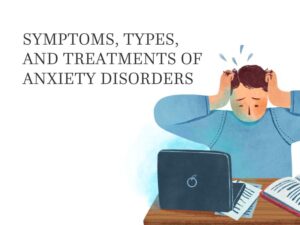Bipolar disorder, also known as manic-depressive illness, is a mental health condition characterized by extreme mood swings, from high periods of mania to low periods of depression. These mood swings can significantly impact an individual’s daily life, including their relationships, education, and career. If you or someone you know is experiencing symptoms of bipolar disorder, it is important to seek help from a mental health professional, such as a bipolar psychiatrist. In this blog, we will explore the symptoms of bipolar disorder and why it is crucial for individuals with bipolar disorder to receive the right treatment.
Symptoms of Mania
Mania is a high period in bipolar disorder characterized by excessive energy, euphoria, and grandiose thoughts. The symptoms of mania can include:
Increased energy and activity levels: individuals may feel like they have unlimited energy and engage in high-risk activities, such as spending sprees or reckless driving.
Increased confidence and self-esteem: individuals may feel overly confident and believe they are capable of anything.
Decreased need for sleep: individuals may feel like they do not need to sleep and can function on little or no sleep.
Rapid and pressured speech: individuals may talk rapidly and struggle to keep up with their own thoughts.
Impulsive behavior: individuals may engage in impulsive behavior, such as sexual promiscuity or substance abuse.
Symptoms of Depression
Depression is a low period in bipolar disorder characterized by feelings of sadness, hopelessness, and a lack of energy. The symptoms of depression can include:
Feelings of sadness and hopelessness: individuals may feel overwhelmed by negative thoughts and emotions.
Loss of interest in activities: individuals may lose interest in activities they once enjoyed and struggle to find pleasure in life.
Changes in appetite and sleep patterns: individuals may experience changes in appetite and sleep patterns, such as overeating or oversleeping.
Fatigue and lack of energy: individuals may feel exhausted and struggle to find the energy to complete daily tasks.
Difficulty concentrating: individuals may struggle to focus and have trouble completing tasks.
Bipolar Disorder Subtypes
There are several subtypes of bipolar disorder, including bipolar I disorder, bipolar II disorder, and cyclothymic disorder. Bipolar I disorder is characterized by manic episodes that last at least 7 days, while bipolar II disorder is characterized by hypomanic episodes that last at least 4 days. Cyclothymic disorder is characterized by alternating periods of hypomania and depression that last at least 2 years.
Treatment for Bipolar Disorder
Bipolar disorder is a treatable condition, and individuals with bipolar disorder can lead fulfilling and successful lives with the right treatment and support. A bipolar psychiatrist can provide a range of treatment options, including medication, therapy, and lifestyle changes, to help individuals manage their symptoms and improve their daily lives.
Medication
Medication is an essential component of treatment for bipolar disorder, and a bipolar psychiatrist can prescribe the appropriate medication to help manage the symptoms of mania and depression. Mood stabilizing medications, such as lithium, and atypical antipsychotics, such as aripiprazole, are commonly used to treat bipolar disorder.
Therapy
Therapy can also be an effective treatment option for individuals with bipolar disorder. A bipolar psychiatrist can refer individuals to a therapist who specializes in the treatment of bipolar disorder. Cognitive behavioral therapy (CBT) and interpersonal and social rhythm therapy (IPSRT) are two types of therapy that can be effective for individuals with bipolar disorder.
Lifestyle Changes
In addition to medication and therapy, lifestyle changes can also be beneficial for individuals with bipolar disorder. A bipolar psychiatrist can work with individuals to develop a treatment plan that includes lifestyle changes, such as regular exercise, healthy eating, and getting enough sleep. Stress management techniques, such as meditation and mindfulness, can also be helpful in managing symptoms of bipolar disorder.
Continuous Support
A bipolar psychiatrist provides ongoing support and guidance to individuals with bipolar disorder. They understand that the symptoms of bipolar disorder can change over time, and they will work with the individual to monitor their progress and adjust the treatment plan as needed. A bipolar psychiatrist is also a trusted resource for individuals with bipolar disorder and their families, providing support and advice as they navigate the challenges associated with the disorder.
Collaboration with Other Health Professionals
A bipolar psychiatrist may also collaborate with other health professionals, such as primary care physicians, psychologists, and therapists, to provide a comprehensive approach to treatment. This type of collaboration ensures that individuals receive the right treatment and support from a team of experts, and that all aspects of their health and well-being are considered.
Reduced Stigma and Improved Quality of Life
Seeking help from a bipolar psychiatrist can also help reduce the stigma associated with the disorder and improve the individual’s quality of life. A bipolar psychiatrist can provide education and support to individuals and their families, helping them to understand the disorder and the best ways to manage it. This type of support can greatly improve the individual’s quality of life, as well as their relationships and their ability to succeed in school and work.
Seeking help from a bipolar psychiatrist is essential for individuals with bipolar disorder. A bipolar psychiatrist has the expertise and training to diagnose bipolar disorder accurately, provide a range of treatment options, and offer ongoing support and guidance. They take a holistic approach to treating bipolar disorder, considering the individual’s physical, emotional, and mental well-being. If you or someone you know is experiencing symptoms of bipolar disorder, it is important to seek help from a bipolar psychiatrist to receive the right treatment and support. With the right treatment and support, individuals with bipolar disorder can lead fulfilling and successful lives.











